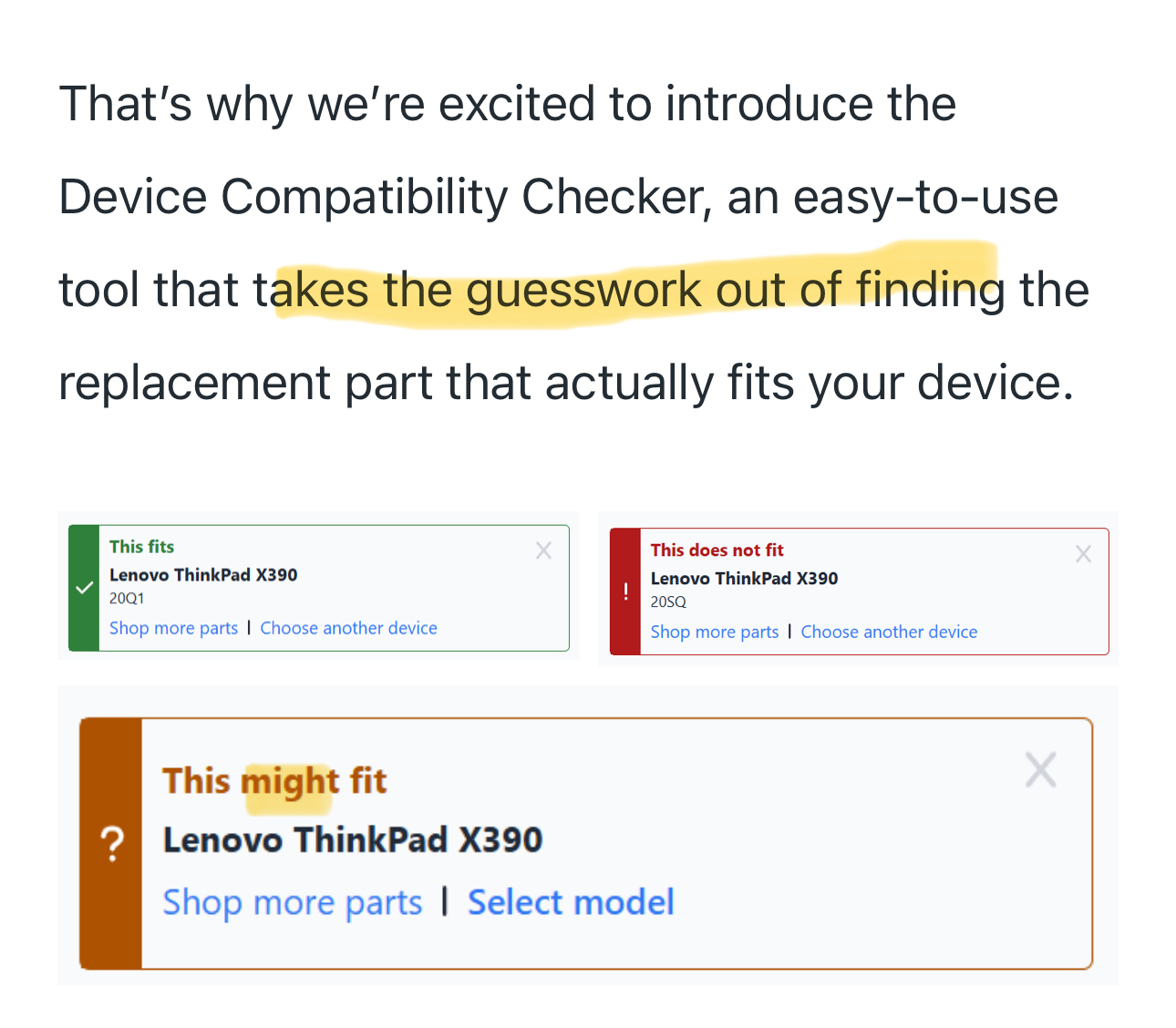

There are maybe three sentences worth of content.
Wrapped.
In stutters.
That make.
It.
Super hard.
To read.
It drives me nuts on LinkedIn; it’s sad to see it’s made the jump to “longform” on substack.


There are maybe three sentences worth of content.
Wrapped.
In stutters.
That make.
It.
Super hard.
To read.
It drives me nuts on LinkedIn; it’s sad to see it’s made the jump to “longform” on substack.


This article isn’t really so much pro indie as it is anti Marvel and DC superheroes. A bunch of the books mentioned are Image or Dark Horse, who I wouldn’t call indies these days. Image is still creator owned (which is a good thing) and Dark Horse has been part of Embracer for awhile (which is not great). I’m genuinely surprised an article about indies doesn’t mention Bone too; that is the poster child for amazing work.


Consultancies don’t exist for improving companies; they exist to make the rich richer while giving some semblance of things like fiduciary duty.




Jokes aside this is fucking rad and a continuation of great things from them. I really dread the day iFixit enshittifies.


This is just distributed functions, right? This has been a thing for years. AWS Lambda, Azure Functions, GCP Cloud Functions, and so on. Not everything that uses these is built on a distributed functions model but a fuck ton of enterprises have been doing this for years.


There were quite a few. The Russians also moved quite a few. Both governments were so obsessed with each other they forgot about war crimes. A significant number of space pioneers across the world had direct ties to human experimentation. Shit’s fucked up.
The first and third apply to TV, radio, podcasts, or possibly even reading. The second isn’t a guarantee (not conclusive for everyone) and can be solved with technology.
The real science here is practicing good sleep hygiene. Your phone is one of many things that can fuck with that; it’s only a small part of it.


This isn’t a lunatic. This is someone trying to make a point about companies thinking they can use AI to replace devs. Poe’s Law is on heavy display here in these comments.
Whether or not you have experienced it, there is currently a trend both in recruiting and in millionaire leadership dialogue toward dropping devs for AI codegen. CEOs that don’t understand how anything works (eg Salesforce) think you can just not hire devs because Google’s inflated AI stats that included basic autocomplete in their full AI codegen numbers indicate AI can code. Boards believe generative AI is capable of things it won’t be able to touch for decades. I have to deal with idiotic AI questions from Fortune 500 companies every fucking week.
From a hiring perspective, it’s becoming incredibly difficult to weed out AI bullshit. For every one qualified candidate I get, I’ve had to drop five or more in a fucking tech screen because, while codegen has given them enough to pass a basic hiring screen that used to weed out a lot more, there’s zero fucking ability to code without Copilot or critical understanding of the code it generates. When I was starting out, the same problem existed at university but got filtered out after graduation fairly quickly.
The non lunatic here is extending that to other disciplines because it’s a natural next question. He’s not exactly applying a slippery slope; it’s sort of there underneath.
Edit: valid criticism of the post is that you have to have a degree to code. That’s bullshit. After my first degree, I went back for CS and dropped out because it was a waste of time. It limited my job pool initially; this far into my career it really does nothing. I’ve hired some solid bootcamp devs. I’ve seen shitty bootcamp devs. I’ve also seen a bunch of CS masters who have no fucking clue how to ship production code but can wax poetic about algorithm design. Since I don’t run an R&D department, that doesn’t matter 95% of the time.


Adding extrinsic rewards for tasks like this can often introduce dark patterns eg maxing reviews to max rewards. It’s not as simple as “just pay someone to read papers.” As much as I detest academic publishers, it’s also not as simple as just throwing everything into open access (which we should do no matter what) and then having folks do it for the good of the community. There will have to be some experimentation with a balance of intrinsic and extrinsic rewards.
In the US I directly pay for the funding for papers through tuition and taxes. I shouldn’t have to fucking pay a parasitic publisher on top of that just to access that shit. In math at least I don’t mind paying a little here and there for an MAA or AMS journal though.


I use uBlock Origin to remove tracking. I also manually remove tracking. Privacy Badger is a tool that works to explicitly do this kind of tidying.


Your analogy doesn’t work at all.
If one of the core harms is the removal of income and tracking, ad blockers fall into this category. Ad blockers very explicitly remove these things. The harm is not “Honey stole my income” it’s “Honey removed my tracking and Honey added their tracking.” Read the Legal Eagle case.


I am genuinely concerned about this because Legal Eagle’s suit is directly tied to manipulating URLs and cookies. The suit, even with its focus on last click attribution, doesn’t make an incredibly specific argument. If Legal Eagle wins, this sets a very dangerous precedent for ad blockers being illegal because ad blockers directly manipulate cookies and URLs. I haven’t read the Gamer’s Nexus one yet.
Please note that I’m not trying to defend Honey at all. They’re actively misleading folks.
Are you looking for an editor that can format YAML out-of-the-box or with plugins? In my experience, most editors only support a small number of formats out of the box and extend that functionality with plugins. I have yet to find a solid, production editor without a decent YAML formatter. If you’re using one of the common commercial ones, Red Hat maintains many that work explicitly for Ansible.


Most of the technical staff isn’t getting ahead at Meta. Any engineer that stays is saying it’s okay to call LGBTQIA+ mentally ill. There are a few top engineers at the absolute pinnacle of their specialization in R&D I wouldn’t apply that to; they have to decide if their science is more important than common human decency.
For non-technical staff, the question is a lot harder. Recruiters, for example, can have a much easier life at Meta than elsewhere. Operations is another area where you can get way better benefits. Everyone has a price on their morals and we can’t judge someone taking that shot too much.
Here’s a different question: at what point do you think a company has gone too far? Enron? SAC Capital? The Weinstein Company? None of these places said LGBTQIA+ was a mental illness; none of them are places I would work. Meta has already actively enabled genocide (if you don’t believe in Uyghurs or Tibet, Myanmar was very explicit). They have actively built policies to exploit not just adults but children too while baking that into their ethos. Now it’s okay to say my gay peers are suffering from a mental illness. Is there a line too far?


Totally agree. I’m glad you read between the lines there. It’s out there if you have the resources to throw at it.
Like most DevOps things, it’s all about the opinionated ecosystem you hop in. It has most things and does most of the stuff you want until you decide to adapt the pattern to your use case and holy fucking shit is it hard to adapt opinionated ecosystems. That’s why I continue to have jobs.


It does with some hoops IIRC. I used act a couple of years ago to test a very distributed flow for enterprise IaC projects. I can’t remember all of the things we had to do and I think I’m conflating some of the podman issues we had on macOS with act issues. AWS credentials were an annoyance, I think, but we worked around it with some community code. Our primary purpose for act was to be the local testing for enterprise action deployment so I’d guess it’s close to yours. I think our conclusion was to distribute the actions to each repo rather than use the central .github repo for actions because of how GitHub handles overrides. My memory is really fuzzy.
If you’re going to believe this internet stranger, start with a very simple set of demos to vet me. I remember being very happy; I do not remember how the team solved it. M

The enshittification of the subscription model here is a gradual increase in ads until you have no choice to purchase on mobile because otherwise your data is tanked. Subscriptions work for now; they might not in the future.


Typically AWS is cheaper than the other majors. Some of the minors can be cheaper if you don’t need all the bells and whistles. AWS’s free tier is incredibly hard to beat for tiny hobby things and learning. At enterprise scale, you really have to go with a major over a minor if you need volume. The minors fit best for a very specific, smaller niche that will never allow them to grow enough to take on the majors.
I have only ever found AWS to be stupid expensive for new things before they get called out for price gouging.


I get so many “new” games either through Humble Choice or bundles that patient for me is really just waiting for it to show up there (which might even be within a year of release). Sometimes I’ll buy stuff brand new but there I use my Humble Discount.
None of your examples are parody movies from companies with a long history of tons of sequels and dumb jokes. This is the fourth movie in a series. It’s basically been in development hell since the early 2000s. I’m not going to say this is quality; it’s not dead IP and it’s not a Kubrick. This is more like beating a dead horse (possibly) that resurrecting something.
If you wanted to make your point, something like Airplane 3 or Men in Tights 2 would have been more apt. AFAIK neither of those have been in development and they’re both from the same vein of late 20th century parody movies. The movies you mentioned would be good responses if a studio rebooted, say, Platoon as a 2000s war movie. Some movie collections like Naked Gun, Scary Movie, Police Academy, and National Lampoon are intended to stick around for a long time (even if they’re just getting progressively fucking worse).